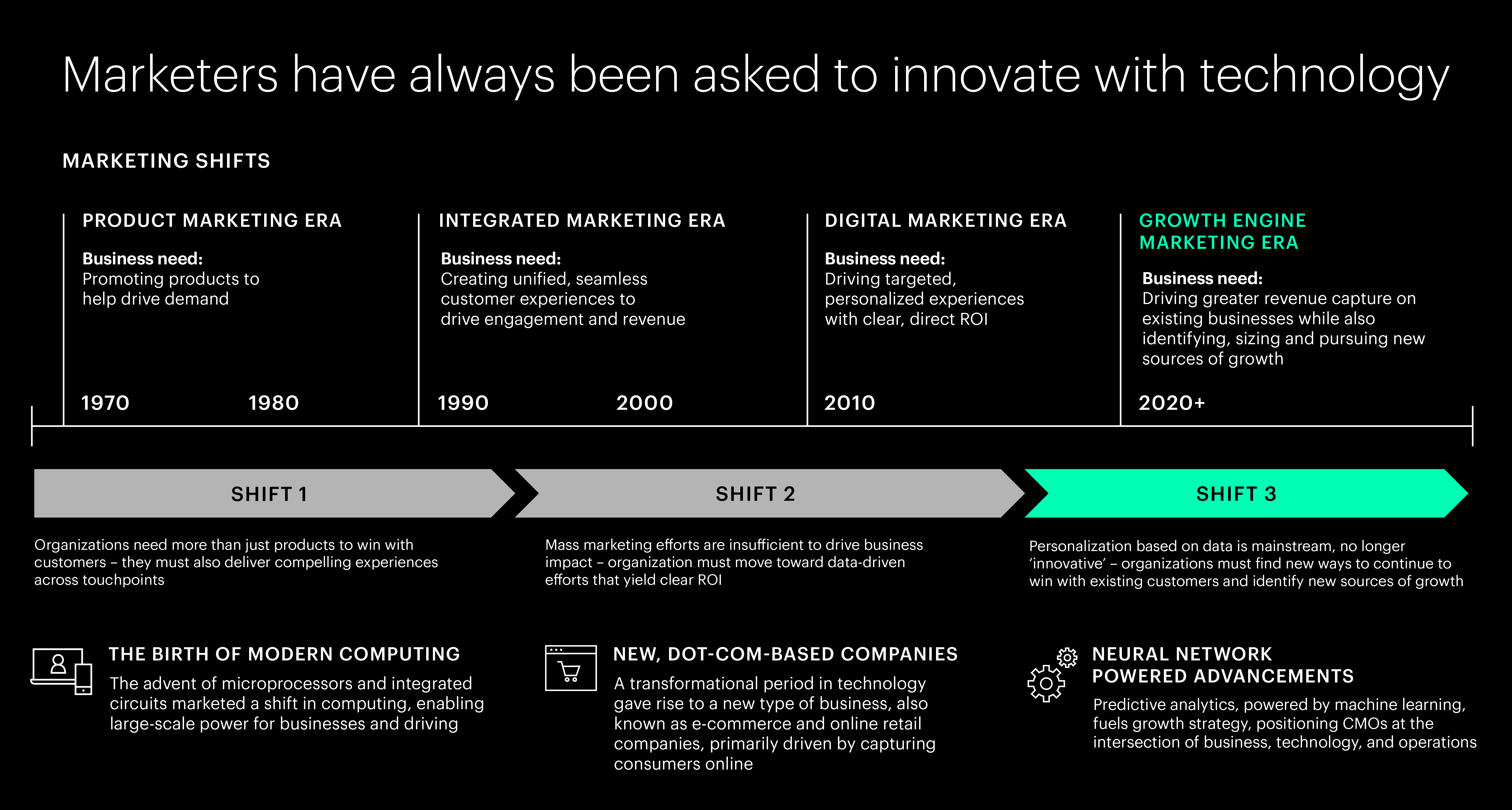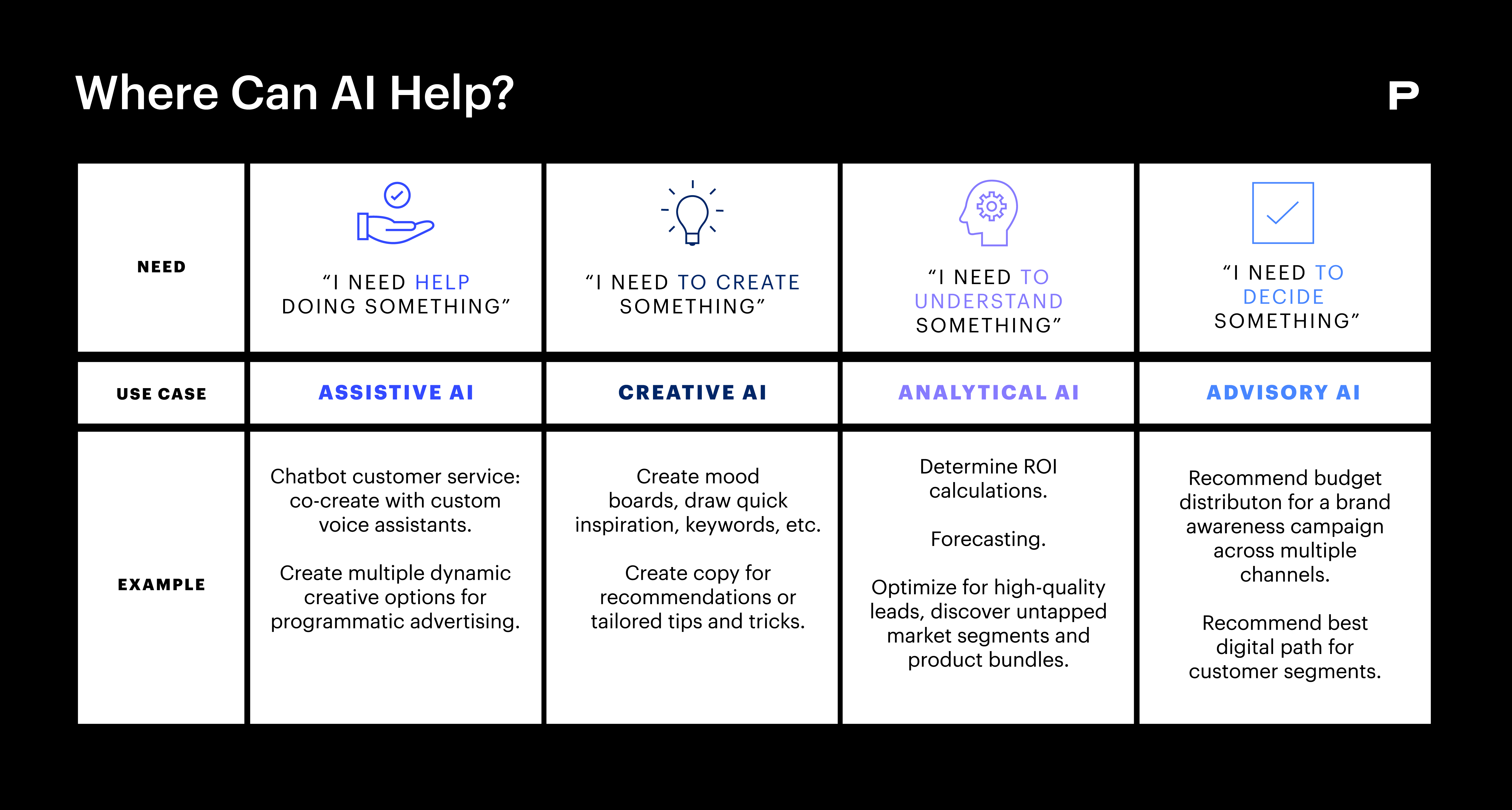BLOG
AI in Marketing: Four Ways to Maximize Value
The emergence of AI is not the first digital shift marketers have experienced. And it won’t be the last. Here are four ways to drive innovation in marketing with AI.
Generative AI has taken center stage in virtually every business article, LinkedIn post and cocktail party conversation. And for good reason – ChatGPT drove one million users in its first five days, turning the technology into a household name and transforming how businesses think about productivity and efficiency. For marketers getting their heads around it and starting to experiment, the potential can be either daunting or inspiring.
Marketers have always been at the forefront of technology. AI and machine learning have been critical in shaping programmatic buying, lifecycle marketing and digital experiences. And for many marketers, this isn’t the first shift they’ve experienced within their role.

A Framework for Supercharging Your Marketing Efforts With AI
It’s helpful to think of AI as a tool to help enhance what you do as a marketer, especially when it comes to thinking about customers and their needs. Here are four ways marketers can use AI to show up for their customers in more connected and cohesive ways:
Unlocking Understanding
Many AI-driven models excel at analyzing unstructured data, text, images, videos and other content that does not fit neatly into traditional databases. Typically, this type of analysis is time-consuming and expensive, requiring its own algorithms.
Marketers can use AI to help analyze large volumes of data, recognize complex patterns, explore and visualize data, perform predictive analytics and provide real-time insights to drive more personalized and optimized marketing strategies and tactics.
Companies like Amazon, Netflix, Meta and Alphabet are far ahead of the curve. But so are non-tech players, such as Johnson & Johnson’s Neutrogena and JP Morgan Chase. All using AI to analyze data and use it in ways that directly benefit customer experience.
Unlocking Value
AI automates repetitive and time-consuming processes, reducing the number of daily tasks, and freeing up hours so that marketers can focus on higher-order priorities that require more strategic, human thinking. Smart marketers are learning ways to turn those found hours into new initiatives, liberating marketing teams to find new avenues of growth.
Adore Me, the e-commerce lingerie company recently acquired by Victoria’s Secret now uses AI to churn out hundreds of product descriptions. While copywriters still need to read, tweak and occasionally edit the blurbs, it estimates it saves up to 40 hours a month per copywriter, with zero impact on sales. Even better? Copywriters hated writing those tedious descriptions. By delegating that work to AI, they can focus on higher-order campaigns that drive additional revenue.
Unlocking Creativity
With more marketers being asked to do more with less resources, AI can be an essential tool. It can help reduce the time it takes to generate creative concepts, create visually appealing and engaging content, facilitate brainstorming processes, and draw insights from past campaigns that can help marketers take personalization to the next level for future campaigns.
Lexus, for instance, used AI to transform its Auto Show experience this year, inviting attendees to enter prompts that quickly personalized their new cars on a 98-inch screen. And political attack ads using AI-created voices of opponents are already reshaping the upcoming election cycle.
Unlocking Differentiation
With its speed of processing data, sifting through customer insights and analyzing competitors, AI can suggest gaps in the market to help companies create personalized, innovative and differentiated experiences that cater to specific customer needs.
For example, Unilever uses AI to explore the human gut, home to trillions of bacteria. Using big-data biology, the company is isolating the microbes with the most calming potential and experimenting with biotech partners to pinpoint food and beverage ingredients that will have the most positive impact on mental well-being. Its Knorr soup division, recently used AI to analyze millions of flavor combinations in days rather than months, using digital modeling to create a zero-salt (but still delicious) soup cube.
To maximize success with AI it’s important to remember that AI is more useful when it is centered on human needs.

Creating an AI-Readiness Checklist
Marketing organizations must also have the necessary data capabilities to implement and operationalize AI effectively. Those include thoughtful attention to:
Data Foundation: Quality Over Quantity
Companies must have high-quality, first-party data stored in secure infrastructures with clear, consistent taxonomy that can be processed at a high volume.
Best Practice: Focusing on securing quality information rather than rushing to get the biggest datasets fast will prevent future inefficiencies and accuracy problems. And despite the focus on large-language models, it’s important to note that many tech companies are experimenting with smaller versions, which may be more accurate and efficient.
Data Value Exchange: Upping the Ante
Companies must offer additive products and services for customers in exchange for their data and provide transparency for how data will be used.
Best Practice: In a world where AI tools are accessible to all, companies can offer trust and respect for privacy as a differentiated yet still personalized experience to customers.
Data Culture & Fluency: The Heart of AI Transformation
Companies must pursue broad AI fluency across the whole enterprise as well as invest in specific data and AI expertise to continuously innovate.
Best Practice: Without the people to understand and strategically use AI at all levels of the organization, companies will not be able to unlock uncommon growth.
Fully implementing AI will require proper evaluation and tracking against an adoption timeline. As soon as possible, begin incorporating AI into workflows, explore opportunities for sustainable optimization and continue to scale it.
Coming soon: New AI research from Prophet will help you understand and serve the AI-powered consumer. Subscribe to our mailing list to be among the first to get their hands on these insights!
FINAL THOUGHTS
Modern marketers have used AI and machine learning in their practices for years and are finding new ways to embrace the possibilities of generative AI. Whether unlocking understanding, value, creativity or differentiation, marketers must remember that AI will be most useful when centered on human needs.

